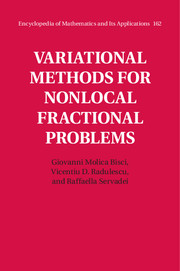Book contents
- Frontmatter
- Dedication
- Contents
- Foreword
- Preface
- Part I Fractional Sobolev spaces
- Part II Nonlocal subcritical problems
- Part III Nonlocal critical problems
- 14 The Brezis–Nirenberg result for the fractional Laplacian
- 15 Generalization of the Brezis–Nirenberg result
- 16 The Brezis–Nirenberg result in low dimension
- 17 The critical equation in the resonant case
- 18 The Brezis–Nirenberg result for a general nonlocal equation
- 19 Existence of multiple solutions
- 20 Nonlocal critical equations with concave-convex nonlinearities
- Bibliography
- Index
20 - Nonlocal critical equations with concave-convex nonlinearities
from Part III - Nonlocal critical problems
Published online by Cambridge University Press: 05 March 2016
- Frontmatter
- Dedication
- Contents
- Foreword
- Preface
- Part I Fractional Sobolev spaces
- Part II Nonlocal subcritical problems
- Part III Nonlocal critical problems
- 14 The Brezis–Nirenberg result for the fractional Laplacian
- 15 Generalization of the Brezis–Nirenberg result
- 16 The Brezis–Nirenberg result in low dimension
- 17 The critical equation in the resonant case
- 18 The Brezis–Nirenberg result for a general nonlocal equation
- 19 Existence of multiple solutions
- 20 Nonlocal critical equations with concave-convex nonlinearities
- Bibliography
- Index
Summary
In this chapter, we focus our attention on the following critical nonlocal fractional problem:
where s ∈ (0, 1) is fixed, and (− Δ)s is the fractional Laplace operator defined, up to normalization factors, as in (1.20), while Ω ∈ ℝn, n > 2s, is open, bounded and with continuous boundary and λ > 0. The main results of this chapter show the existence and multiplicity of solutions to problem (20.1) for different values of λ. The dependency on this parameter changes according to whether we consider the concave power case (0 < q < 1) or the convex power case (1 < q < 2s*−1). These two cases will be treated separately.
One also can define a fractional power of the Laplacian using spectral decomposition, as discussed in Chapter 5. The same problem is considered here, but this spectral fractional Laplacian was treated in [22]. Some related problems involving this operator have been studied in [42, 51, 73, 214]. As in [22], the purpose of this chapter is to study the existence of weak solutions for (20.1).
Problems similar to (20.1) have been also studied in the local setting with different elliptic operators. As far as we know, the first example in this direction was given in [111] for the p-Laplacian operator, Δp (see Chapter 1). Other results, this time for the Laplacian (or essentially the classical Laplacian) operator, can be found in [2, 8, 22, 39]. More generally, the case of fully nonlinear operators was studied in [66].
It is worth noting here that problem (20.1), with λ = 0, has no solution whenever Ω is a star-shaped domain. This was proved in [103, 185] using a Pohozaev identity for the operator (− Δ)s. This fact motivates the perturbation term λuq, λ > 0. The results of this chapter were obtained in [23].
Main results
We now summarize the main results of this chapter. First, in Section 20.2, we will look at problem (20.1) in the concave case q < 1, and we will prove the following result:
Theorem 20.1Let s ∈ (0, 1), n > 2s, and q ∈ (0, 1).
- Type
- Chapter
- Information
- Variational Methods for Nonlocal Fractional Problems , pp. 344 - 370Publisher: Cambridge University PressPrint publication year: 2016



